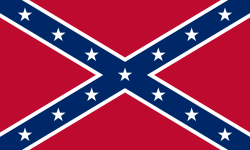It has been suggested that this article be merged into White Southerners#Antebellum era . ( Discuss ) Proposed since November 2025. |


Confederate patriotism refers to the patriotism of people towards the historic Confederate States of America located in what is now the southern United States. [1] This patriotism arose as a result of the rise of a White Anglo-Saxon Protestant identity initially after founding of New England Confederation and intensified as the escalation of dispute between United States Northerners and Southerners over states' rights, Southerners identified themselves as a separate group of people from the people associated with the Union whom Southerners referred to as "Yankees". [2]